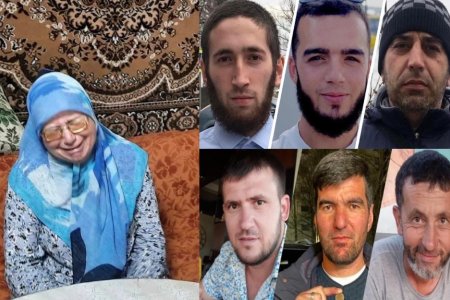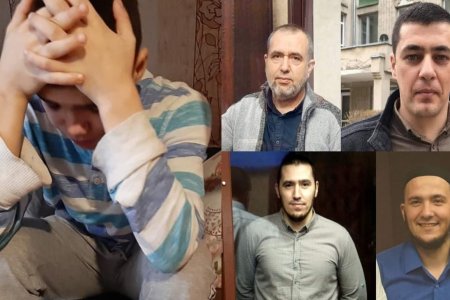
Six Crimean Tatar civic activists are on ‘trial’ in Russia, facing sentences of up to 20 years, with even a prosecution witness proving unwilling to stand up in court and pretend that the charges are warranted. The reaction from both prosecutor and presiding ‘judge’ Roman Viktorovich Saprunov to this rare demonstration of integrity make it clear just why the process underway in Russia’s notorious Southern District Military Court in Rostov is a trial in name alone.
The six men - Ruslan Asanov (b. 1975); Remzi Nimetulayev (b. 1985); Seidamet Mustafayev (b. 1995); Abdulmedzhit Seitumerov (b. 1999); Ametkhan Umerov (b. 1986) and Eldar Yakubov (b. 1980) have been imprisoned since Russia staged its latest armed operation against peaceful Crimean Tatar families on 25 August 2023. This was the latest case where the FSB were, evidently, targeting activists from the vital Crimean Solidarity human rights movement. It was, however, also particularly tragic as the FSB had already, three years earlier, come for the two elder sons, Seitumer and Osman Seitumerov, of renowned Crimean Tatar historian Shukri Seitumerov and his wife Lilia, and now took their last son, 23-year-old Abduledzhit, from them.
The three brothers’ great-grandfather had, during Stalin’s Terror, been executed for so-called ‘counter-revolutionary terrorist propaganda’. The Russian regime, illegally occupying Crimea, has slightly modified this, with the men all accused under Russia’s ‘terrorism’ legislation on the basis of a flawed and secretive Supreme Court ruling in 2003. That declared Hizb ut-Tahrir, a peaceful, if controversial, Muslim movement which is legal in Ukraine, ‘terrorist’, without providing any grounds. The FSB have, since soon after Russia’s invasion of Crimea, been using that ruling and fabricated evidence of ‘involvement’ in Hizb ut-Tahrir to sentence Crimean Muslims, particularly Crimean Solidarity civic journalists and activists, to huge terms of imprisonment. All of those convicted on such spurious charges are recognized as political prisoners, some also as Amnesty International prisoners of conscience, and their release is repeatedly demanded by democratic states and international bodies.
One disturbing aspect of this persecution in occupied Crimea has been the behaviour of the Directorate of Muslims of Crimea’ [DUMK] under mufti Emirali Ablayev, who chose in 2014 to collaborate with the Russian invaders. Ablayev and his people have been suspected over the years of collaborating with the FSB in persecuting Crimean Muslims whose communities are viewed as ‘too independent’ or, in at least one case, in order to illegally gain control of a historic mosque in the centre of Alushta.
The prosecution witness questioned during one of the hearings in June 2025 was Ruslan Baiirov, a former employee of the Directorate of Muslims of Crimea. He had earlier given written ‘testimony’ supporting the indictment against the men. In court, however, he stated that he had been aware of the activities of Hizb ut-Tahrir since before 2014, and did not know of any involvement by the organization in acts of terrorism; violence or terror. He also stated that he did not know why Hizb ut-Tahrir had been added to Russia’s list of ‘terrorist organizations’. According to defence lawyer Edem Semedlyaev, Baiirov said that, as far as he knew, the main aim of members of Hizb ut-Tahrir was the formation of a state with Islamic form of government on the territory of Arab states. They plan to achieve that aim through non-violent means and therefore deny any involvement in terrorist activities.
All of the above was quite correct, but clashed with the narrative Russia is using for these surreal ‘terrorism’ charges. The prosecutor asked to have Baiirov’s written testimony, which did not clash, read out, with Suprunov, as always, agreeing.
After the earlier statement was read out, the defence pointed to the very significant differences between that testimony and Baiirov’s answers in court. In the earlier testimony, Baiirov was said to have claimed that “members of Hizb ut-Tahrir aim to change the political system and state order of the Russian Federation.” In court, Baiirov said the exact opposite, that Hizb ut-Tahrir members do not seek to do this.
As has repeatedly been the case, Suprunov dismissed crucial questions, including Semedlyaev’s question regarding the reason for such a major and critical difference in testimony. According to lawyer Emil Kurbedinov, many of the other questions which the defendants were prevented from asking, were also of importance.
As reported, in December 2024, Suprunov actively blocked questions from the defendants aimed at proving that a key ‘secret witness’ was lying.
During the last hearing, on 16 June 2025, FSB operative, Renat Valikulin, appeared as last witness for the prosecution. According to Kurbedinov, he did not answer a single question from the defence, instead, either claiming that he did not remember or that “it’s all in the case material”. Here too, Suprunov dismissed almost all questions that the lawyers or defendants themselves tried to put.
There is now a break until 11 August when the defence will begin presenting their evidence. The men, most of whom have children, have been imprisoned since 25 August 2023, first in a Crimean SIZO [remand prison], now in a SIZO in Rostov.
In all these ‘trials’, the men are charged with either ‘organizing a Hizb ut-Tahrir group’ (under Article 205.5 § 1 of Russia’s criminal code) or with ‘taking part in such an alleged Hizb ut-Tahrir group (under Article 205.5 § 2. In occupied Crimea, after armed searches where the FSB make no pretence of looking for anything but ‘prohibited literature’, the men are also invariably accused of ‘planning a violent uprising’ (Article 278).
Ruslan Asanov is facing the more serious ‘organizing a Hizb ut-Tahrir group’ (Article 205.5 § 1), together with Article 278, and a sentence of 17-19 years. The other men are accused of ‘taking part’ in this entirely unproven ‘group’, and face sentences of around 12-14 years.
Please write, if you can, to one or more of the men!
The letters tell them and Moscow that they are not forgotten and that Russia’s persecution and the fate of its victims are under scrutiny. Letters need to be in Russian, handwritten, and on ‘safe’ subjects. If that is a problem, use the sample letter below (copying it by hand), perhaps adding a picture or photo. Do add a return address so that the men can answer.
Sample letter
Добрый день,
Желаю Вам крепкого здоровья и надеюсь, Вы скоро вернетесь домой, к своим родным. Простите, что мало пишу – мне трудно писать по-русски, но мы все о Вас помним.
[Hi. I wish you good health and hope that you will soon be home, with your family. I’m sorry that this letter is short – it’s hard for me to write in Russian., but you are not forgotten. ]
Address (this can be written in Russian or English)
Ruslan Asanov
344022, РФ, г. Ростов-на-Дону, ул. Максима Горького, д. 219, ФКУ СИЗО-1 Асанову Руслану Ремзиевичу, 1975 г. р.
or in English
344022 Russian Federation, Rostov on the Don, 219 Maxim Gorky St, SIZO-1
Asanov, Ruslan Remzievich, b. 1975
Seidamet Mustafayev
344022, РФ, г. Ростов-на-Дону, ул. Максима Горького, д. 219, ФКУ СИЗО-1 Мустафаеву Сейдамету Энверовичу, 1995 г. р.
or in English
344022 Russian Federation, Rostov on the Don, 219 Maxim Gorky St, SIZO-1
Mustafayev, Seidamet Enverovich, b. 1985
Remzi Nimetulayev
344022, РФ, г. Ростов-на-Дону, ул. Максима Горького, д. 219, ФКУ СИЗО-1 Ниметулаеву Ремзи Синаверовичу, 1985 г. р. or in English
344022 Russian Federation, Rostov on the Don, 219 Maxim Gorky St, SIZO-1
Nimetulayev, Remzi Sinaverovich, b. 1985
Seitumerov, Abdulmedzhit
344022, РФ, г. Ростов-на-Дону, ул. Максима Горького, д. 219, ФКУ СИЗО-1 Сейтумерову Абдулмеджиту Шукриевичу, 1999 г. р.
or in English
344022 Russian Federation, Rostov on the Don, 219 Maxim Gorky St, SIZO-1
Seitumerov, Abdulmedzhit Shukrievich, b. 1999
Ametkhan Umerov
344022, РФ, г. Ростов-на-Дону, ул. Максима Горького, д. 219, ФКУ СИЗО-1 Умерову Аметхану Айдеровичу, 1986 г. р.
or in English
344022 Russian Federation, Rostov on the Don, 219 Maxim Gorky St, SIZO-1
Umerov, Ametkhan Aiderovich, b. 1986
Eldar Yakubov
344022, РФ, г. Ростов-на-Дону, ул. Максима Горького, д. 219, ФКУ СИЗО-1 Якубову Эльдару Эскендеровичу, 1980 г. р.
or in English
344022 Russian Federation, Rostov on the Don, 219 Maxim Gorky St, SIZO-1
Yakubov, Eldar Eskenderovich, b. 1980



